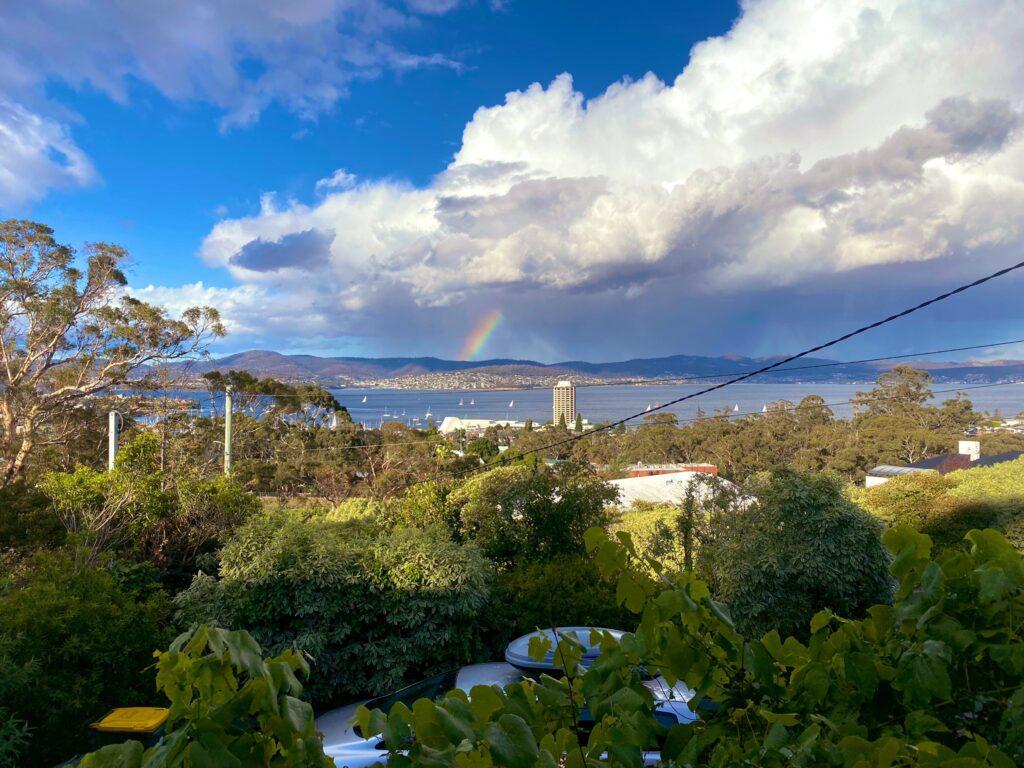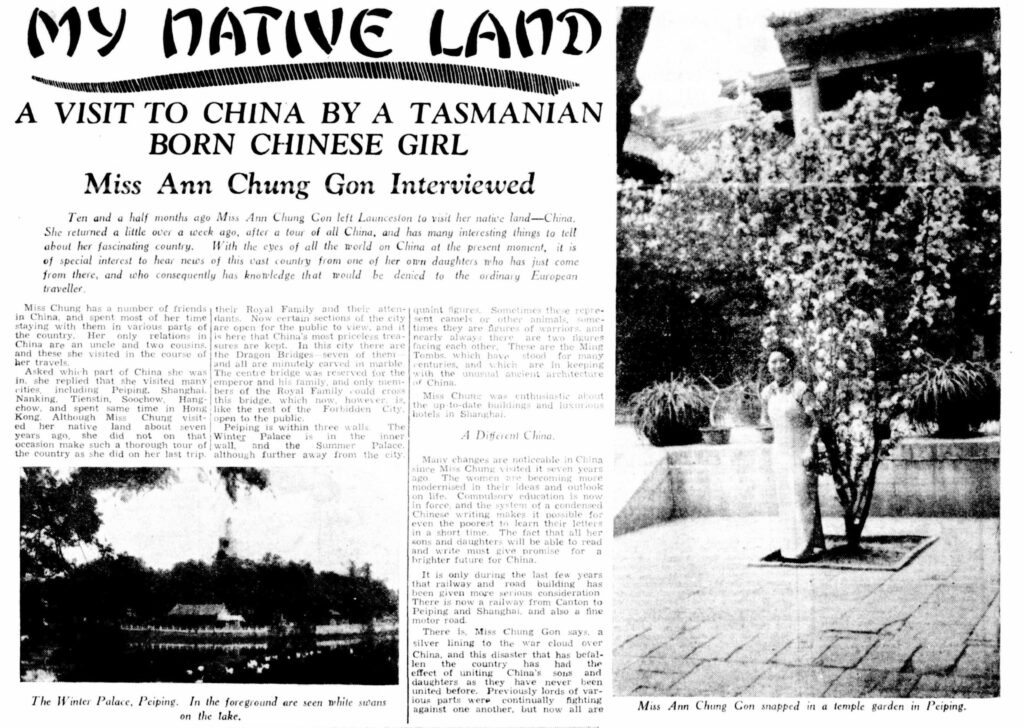It goes without saying that 2020 has been a strange and difficult year.
I started the year by moving from Canberra to Hobart, after three months of remote working in my new job at UTAS (as Senior Lecturer in Humanities and Course Coordinator of the Diploma of Family History). I was incredibly sad to be moving so far from Canberra, to be leaving our home of 20 years, to be uprooting my family and separating our kids from each other – the three big ones chose to remain, while the little one had to come with us. But it was also a relief to be leaving the thick smokey air and orange skies and anxiety and asthma that the bushfires had brought over December and January. Then, just as we were starting to feel a little bit settled in Hobart, COVID hit Australia. I had seen COVID come into the lives of friends in Guangdong and Macau, feeling very lucky that it wasn’t us who were in lockdown – but then we were too.
Of all the places in the world to spend 2020, Hobart has been pretty great. But being in a new job, in a new city, on an island cut off from family and friends on the mainland, in Melbourne, Sydney and Canberra, has been hard, so hard. And now, our plans of returning home to visit in the new year look unlikely due to the recent COVID outbreak in Sydney.
So, it’s with all that in mind that I’m writing this ‘year in review’ post – to help me see through my continually teary eyes that I’ve accomplished something at work this year. See the list below, if you want the details.
My biggest accomplishment this year hasn’t really been at work though. It’s been to get myself, my teenager and my tween through the year in more or less one piece, and to see them finally looking towards 2021 (and more particularly, 2021 in Hobart) with a sense of hope and perhaps even happiness. I couldn’t have achieved that without support from Tim, Sophie, Nicki and Molly the Labrador on the home front, and from my stellar colleague and font-of-Tasmanian-knowledge, Imogen, at work.

Things I’ve accomplished at work this year
Here’s my list of work things I’m happy to have accomplished this year, in no particular order:
- my probation at UTAS going through early, after 12 months (yay me!)
- our major course changes for R2H Diploma of Family History for 2021 being approved by Senate – and being complimented on the excellence of my course change paperwork
- preparing a proposal and gaining approval for my new unit, HAA108 Migrant Families, to be introduced into the Diploma of Family History in 2021
- concurrently coordinating two units (HAA003 and HAA107) between July and September with a combined enrolment of over 900 students, with 6 tutors to manage – note to self: never do this again; you literally had 3 days where you didn’t work between June and October
- revising HAA003 Introduction to Family History and developing 3 weeks’ content for our new unit, HTA206 Australian History in a Global Context, all done from home and taught online
- finalising Locating Chinese Women: Historical Mobility between China and Australia, forthcoming with HKU Press in early 2021 – included working on the cover and marketing materials, commissioning and checking the index, and checking three rounds of proofs
- submitting an application for the ARC Special Research Initiative for Australian Society, History and Culture with Julia Martínez and Sophie Couchman – we weren’t successful (only 7.1% of application were), but we were ranked between 10% to 25% of unsuccessful proposals within the scheme round (with three of the four selection criteria ranked at top 10%)
- dealing with a plagiarism matter, where a PRC researcher had published an article, in Chinese in a PRC-based journal, that was largely based on my research
- speaking via Zoom at the ‘Asia at the Crossroads: Ruptures and Hopes’ symposium, organised by the Melbourne-Monash Asia Studies Reading Group, on 31 July 2020
- speaking with my UTAS colleague Imogen Wegman at Libraries Tasmania in Hobart for Family History Month on 13 August 2020
- assisting/speaking to researchers/journalists: Kirsty Walsh (Who Do You Think You Are?), Ingrid Piper (commissioned by Australian Consulate, Hong Kong); Mell Chun (freelance journalist working on a project supported by a Judith Neilson and Walkley Fund grant)
- being invited to participate in a three ARC applications (two I had to decline), including an ARC Linkage project with Tracy Ireland, Jane Lydon, Tim Sherratt and GML Heritage, which we submitted in December
- being invited to contribute to two publications – an edited collection by Tony Ballantyne and a special journal issue on Chinese NZ/Australian history/heritage – in which I’ll write up more of my Chinese naturalisation research
- progressing the Subjects and Aliens edited collection I’m working on with Peter Prince, with the aim of submitting it to a publisher in 2021
- getting to work with some truly excellent colleagues at UTAS – with special mention to the professional staff who help me do my job better, in particular Carol, Melinda, Scott, and the wonderful young women in the Family History Contact Team this year, Maddy, Emma and Meredith
- supervising my first Honours student, who achieved First Class Honours and also got herself a graduate job in the Department of Premier and Cabinet starting next year (yay Britt!)
- beginning to think about and dig into Chinese Tasmanian history, particularly about Tasmanian Chinese family histories and how I might sneak Tasmania into my Chinese naturalisation book

Where my work has been cited, 2019–2020
For the record, here are some publications from 2019 and 2020 that have cited my work. I’ve included 2019 here because I didn’t manage to publish a ‘2019 in review’ post last year (too busy settling into new job, selling our house, packing, etc).
Barnwell, Ashley, ‘Keeping the Nation’s Secrets: “Colonial Storytelling” within Australian Families’, Journal of Family History, 46, no. 1 (January 2021), pp. 46–61, https://doi.org/10.1177/0363199020966920.
Berthon, Hilary, ‘A Treasure Trove of Community Language Newspapers’, in Catherine Dewhirst and Richard Scully (eds), The Transnational Voices of Australia’s Migrant and Minority Press, Palgrave Macmillan, 2020, https://doi.org/10.1007/978-3-030-43639-1_11.
Charak, Sarah Edith, ‘Anglo-Jews and Eastern European Jews in a White Australia’, Honours Thesis, Department of History, University of Sydney, 2019, http://hdl.handle.net/2123/21137.
Cheng, Christopher, ‘Beacons of Modern Learning: Diaspora-Funded Schools in the China-Australia Corridor’, Asian and Pacific Migration Journal, 29, no. 2 (June 2020), pp. 139–62, https://doi.org/10.1177/0117196820930309.
Chua, J.Y., ‘ “An Open and Public Scandal” in the Transvaal: The 1906 Bucknill Inquiry in a Global Context’, Journal of the History of Sexuality, 29, no. 2 (2020), pp. 135–161.
Fitzpatrick, Matthew P. and Peter Monteath, ‘Amidst Empires: Colonialism, China and the Chinese’, in Peter Monteath and Matthew P. Fitzpatrick (eds), Colonialism, China and the Chinese, Taylor & Francis Group, 2019.
Gibson, Peter, ‘The Market Gardens of Dark Dragon Ridge, New South Wales, Australia, 1876–1930’, Australian Economic History Review, 60 (2020), pp. 372–393. https://doi-org.ezproxy.utas.edu.au/10.1111/aehr.12195.
Gibson, Peter, and Simon Ville, ‘Australian Wool and Chinese Industrialization, 1901–1941’, Twentieth-Century China, 44, no. 3 (2019), pp. 265–287.
Kuo, Mei-fen, ‘The “Invisible Work” of Women: Gender and Philanthropic Sociability in the Evolution of Early Chinese Australian Voluntary Organisations’, in John Fitzgerald and Hon-ming Yip (eds), Chinese Diaspora Charity and the Cantonese Pacific, 1850–1949, Hong Kong University Press, 2020.
Kuo, Mei-fen and John Fitzgerald, ‘Colonial Pathways to International Education: Chinese Students in White Australia in the 1920s’, in Peter Monteath and Matthew P. Fitzpatrick (eds), Colonialism, China and the Chinese, Taylor & Francis Group, 2019.
Kwok, Juanita, ‘Waltzing the Dragon with Benjamin Law’, History Australia, 17, no. 1 (2020), pp. 192–194.
Kwok, Juanita, ‘Chinese Mining on the Turon: From Beginning to End’, Journal of Australasian Mining History, 17 (Oct 2019), pp. 75–95.
Lake, Marilyn, ‘Geneva (ILO) Conventions: Located but Not Made There’, Labor, 16, no. 2 (2019), pp. 49–54, https://doi.org/10.1215/15476715-7323625.
McCarron, Barry. ‘ “Make it too hot for them to stop in the colony”: The Irish Stance on the Chinese Question in Australia, 1851–1901’, Australasian Journal of Irish Studies, 20 (2020), pp. 99–124.
May, Andrew, Helen Morgan, Nicole Davis, Sue Silberberg and Roland Wettenhall, ‘Untimely Ends: Place, Kin and Culture in Coronial Inquests’, Provenance: The Journal of Public Record Office Victoria, 18 (2020), https://prov.vic.gov.au/explore-collection/provenance-journal/provenance-2020/untimely-ends.
Rhook, Nadia,‘ “The Chinese Doctor James Lamsey”: Performing Medical Sovereignty and Property in Settler Colonial Bendigo, Postcolonial Studies, 23, no. 1 (2020), pp. 58–78.
Robson, Charmaine, ‘Doctors’ Dilemma: Appraising the Rights of New South Wales Leprosy Sufferers, 1890–1950′, Health & History: Journal of the Australian & New Zealand Society for the History of Medicine, 22, no. 1 (2020), pp. 126–49.
Sawaki, Tomoko, ‘Interacting Voices Structure a Text: A Quantitative Investigation of Dialogic Elements Across Structural Units in the Introductory Chapters of History Theses’, Functions of Language, 27, no. 2 (2020), pp. 174–206, https://doi.org/10.1075/fol.17037.saw.
Sayers, Jentery, ‘Bringing Trouvé to Light: Speculative Computer Vision and Media History’, in Kevin Kee and Timothy Compeau (eds), Seeing the Past with Computers: Experiments with Augmented Reality and Computer Vision for History, University of Michigan Press, 2019, https://www.jstor.org/stable/j.ctvnjbdr0.5.
See, Pamela M., ‘The Agency of Papercutting in the Post-Digital Era’, PhD Thesis, Queensland College of Art, Griffith University, 2020.
Williams, Michael, ‘Stopping Them Using Our Boats’, Australian Economic History Review, 2020, https://doi-org.ezproxy.utas.edu.au/10.1111/aehr.12207.
Wilton, Janis, ‘Histories of the Chinese in Regional NSW 1850–1950’, Journal of the Royal Australian Historical Society, 105, no. 1 (2019), pp. 49–69.